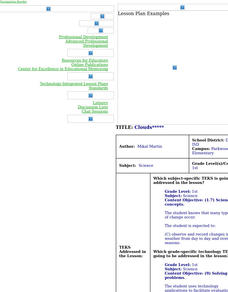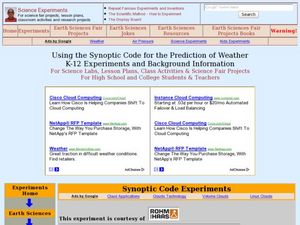Curated OER
Measuring Cloud Coverage
Students explore Earth science by completing weather symbol worksheets. In this cloud identification activity, students identify the different types of clouds in the sky and how they are formed. Students complete a cloud measurement...
Curated OER
Cloud Types and Formation of Clouds
Students observe and photograph clouds. In this cloud lesson, students make a cloud scrapbook by photographing and completing a worksheet describing the clouds. Students record other sky events such as rainbows.
Curated OER
Three Clouds Activity
Students understand how clouds are formed. In this cloud lesson, students participate in three experiments to make clouds. Students complete activity sheets for each experiment.
NOAA
Make Your Own Volcano!
Make a volcano erupt in your own classroom! Young scientists use household and craft materials to model and simulate the eruption of a volcano.
Curated OER
Weather or Not (Cloud Formation/Condensation)
Students investigate the formation of clouds and rain in this experiment. They decide how dust in the air helps to make clouds form and how dust helps meteorologists make forecasts.
North Carolina Museum of Natural Sciences
Weather Watch Activity Guide: Groundhog Day
Exactly what do groundhogs know about weather? Not as much as your science students will after completing these lessons and activities that cover everything from the earth's rotation and the creation of shadows, to cloud...
DLTK
Groundhog Paper Craft
Get crafty this Groundhog's Day with a hands-on activity that combines creativity and making predictions. Scholars color, cut out, and put together a friendly image of a groundhog and showcase whether they feel the weather will be sunny...
Curated OER
Clouds
Students explore clouds. In this weather lesson, students identify the steps in the water cycle, define condensation and evaporation, and relate this information to cloud formation. Students perform a cloud experiment, predict weather...
Curated OER
Seasonal Cloud Cover Variations
Young scholars, in groups, access data from the NASA website Live Access Server regarding seasonal cloud coverage and the type of clouds that make up the coverage. They graph the data and make correlations between types, seasons and...
Curated OER
CLOUD IN A BOTTLE
Students make observations of what they see happening in the formation of a cloud in a modeled situation. They compile their observations in a list to better explain how the formation happened.
Curated OER
Combining Clouds and Art in the Classroom
Students observe landscape paintings consisting of cloud formations. In this identifying cloud types lesson, students discover different cloud types and characteristics by looking at paintings. Students paint their own pictures at the...
Curated OER
Clouds
Students explore basic cloud types and the weather associated with each one. In this earth science lesson, students participate in numerous activities including going outside to observe the clouds they see, making a cloud in a jar,...
Curated OER
Cloud and Weather Patterns
Fourth graders examine how weather patterns generally move from west to east across the United States, and how clouds are formed and are related to the water cycle. They view and discuss a PowerPoint presentation of the types of clouds,...
Curated OER
Hey You, Get Off My Cloud
Second graders identify different types of clouds. In this cloud lesson plan, 2nd graders describe clouds as cumulus, cirrus, or stratus and explain their formation. They discuss how the clouds affect the weather conditions.
Curated OER
Cloud Fun
Young scholars observe cumulus clouds. In this weather lesson, students go outside to look at cumulus clouds and observe what the weather is like when they find these types of clouds. They create a cumulus cloud in an art project and...
Curated OER
Naming the Clouds
Fourth graders examine how water condenses into clouds and identify the different types of clouds using the same system devised over 200 years ago. They listen to a book about clouds, and create a Cloud Key. Next, they record their...
Curated OER
Clouds
In this weather activity, students read a detailed information sheet about different kinds of clouds and what weather they bring. Students answer 12 questions
Curated OER
How Are Clouds and Fog Formed?
Fifth graders investigate how clouds and fog are made of tiny droplets of water. They discuss how clouds and fog are formed, then conduct an experiment in which they observe what happens when an ice cube is placed on top of a bottle...
Curated OER
Clouds
First graders create a PowerPoint presentation and identify three types of clouds; cirrus, stratus and cumulus. In addition, 1st graders construct their own type of cloud during a hands-on activity.
Curated OER
Create a Cloud in a Bottle
Students look at how clouds form. In this cloud lesson plan, students make a cloud using water, 2 liter bottles and a match. They watch how the pressure and temperature changes the atmosphere in the bottle to create a cloud.
Curated OER
Using the Synoptic Code for the Prediction of Water
Students construct a thermoscreen for the experiment. In this earth science instructional activity, students make observations and interpret them using synoptic codes. They predict the weather based on gathered information.
Curated OER
Using the Synoptic Code for the Prediction of Weather
Young scholars interpret the synoptic code. They construct a thermoscreen with an anemometer. Students identify different types of clouds and understand and read barometric pressure. Young scholars predict weather pattern as they apply...
Curated OER
Clouds and the Earth's Radiant Energy System
Wow! What a lesson plan! Six terrific activities are described in great detail, in this 31-page document! Learners will model and explain cloud formation, sketch and identify certain cloud types, calculate and compare incoming and...
Khan Academy
Challenge: Parting Clouds
Let the sun shine as your young coders move the clouds across the sky while practicing animation coding skills in JavaScript. Younger learners may benefit from more guided help or a whole-class discussion before trying this coding task.

























